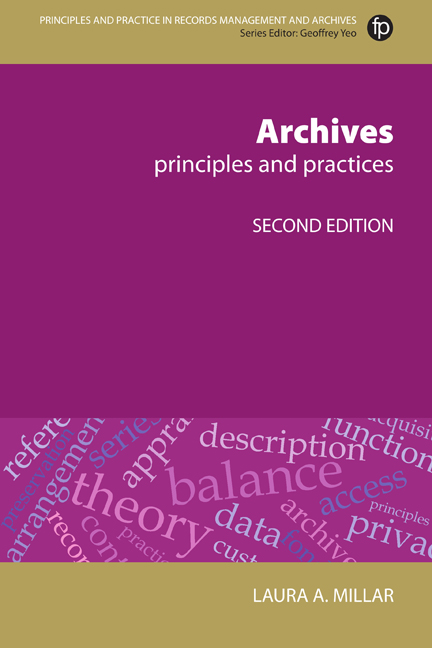Book contents
- Frontmatter
- Contents
- Figures and tables
- Foreword to the first edition
- Foreword to the second edition
- Acknowledgements
- Introduction to the second edition
- PART I ARCHIVAL PRINCIPLES
- 1 What are archives?
- 2 The nature of archives
- 3 Archival history and theory
- 4 The uses of archives
- 5 Types of archival institution
- 6 The principles of archival service
- 7 Balancing access and privacy
- PART II ARCHIVAL PRACTICES
- Conclusion
- To learn more
- Glossary of terms
- Index
- Miscellaneous Endmatter
4 - The uses of archives
from PART I - ARCHIVAL PRINCIPLES
Published online by Cambridge University Press: 08 June 2018
- Frontmatter
- Contents
- Figures and tables
- Foreword to the first edition
- Foreword to the second edition
- Acknowledgements
- Introduction to the second edition
- PART I ARCHIVAL PRINCIPLES
- 1 What are archives?
- 2 The nature of archives
- 3 Archival history and theory
- 4 The uses of archives
- 5 Types of archival institution
- 6 The principles of archival service
- 7 Balancing access and privacy
- PART II ARCHIVAL PRACTICES
- Conclusion
- To learn more
- Glossary of terms
- Index
- Miscellaneous Endmatter
Summary
To be ignorant of what occurred before you were born is to remain always a child. For what is the worth of human life, unless it is woven into the life of our ancestors by the records of history?
Marcus Tullius Cicero (106–43 BC) Orator, 46 BCWhy should societies keep archives at all? Who cares about preserving the documentary remains of anyone's life or work or keeping the evidence of government or corporate decisions? Why do we bother recording our activities and experiences at the time they happen, and why should anyone bother committing the resources needed to keep those accounts for the indefinite future?
Archives are not just ‘neat old stuff’. As discussed already, archivists today define archival materials first and foremost as sources of documentary evidence. Archives prove rights, confirm obligations, verify events and substantiate claims. They help us remember the past, and they safeguard us against inaccurate recollections or intentional deceit. A written contract reminds two parties of their agreements, but it also prevents one or the other party from avoiding their obligations, because the document exists as proof of the original accord. A photograph of the family at sunset on the beach helps us remember a wonderful holiday, but it also serves as proof that we were on that trip at that specific time. One of the first steps in deciding whether or not to keep archives, then, is to consider their potential value as evidence, which allows the archivist to ensure that, at the very least, she has captured those archives that can be used as proof.
But in order to make a thoughtful decision about whether or not to keep any group of archival materials, it is important to remember that archives are ultimately kept in order to be used, by anyone for any reason. Researchers, scholars and average citizens refer to archives to find proof; to gather research data; to illustrate, illuminate or explain. Archives are tools that people use to look beyond the present moment and understand the wider context of a family, community or society. Like George Mallory who said he wanted to climb Mount Everest ‘because it's there’, anyone can use archives for any reason, as long as the archives ‘are there’.
Information
- Type
- Chapter
- Information
- ArchivesPrinciples and Practices, pp. 67 - 78Publisher: FacetPrint publication year: 2017
